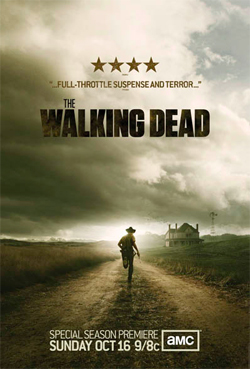[SPOILER ALERT: This post contains Season 2 spoilers of The Walking Dead. I’m not kidding. Seriously important ones. If you have any interest in enjoying this show, stop reading, bookmark this page, and come back later. Otherwise, read away. Chris and Emily, you are absolved.]

The second season of The Walking Dead revealed the most important ethical quandry of the zombie apocalypse: life and death when we suddenly are given a third option of undeath.
In the pilot episode in the first season, we are forced to see how altered the notion of life and death is when undeath is added. Our existing ethic is, and needs to be, “thou shalt not kill” and is generally applied to mean “in any case.” We may quibble around the gray areas of self defense and the like, but as a whole, killing is bad. We reprioritize quickly in the kill-or-be-killed world to recognize that killing the undead is not only justified, but tangibly different from killing the living. But in that episode, we are introduced to the killing of an undead loved one. The personal struggle with a wife turned into a zombie is shown, not told, and we watch as the husband wrestles with showing mercy to her and what his own actions will bring.
Early in the season, we are treated to the more existential question of brining a new life into the zombie apocalypse, and whether our ethic of protecting life supercedes the inevitability of that life’s torment and eventual undeath. Though the show takes a more practical approach, the finale makes this question even more disturbing, as the life being protected will certainly become a perversion of life at some point.
The more troubling argument occurs over the decision to save the life of a stranger in the midst of a zombie horde, treat him medically so that he doesn’t die at that moment, only to dump him off in a random location with no supplies or means of communicating with his friends and family. In this case, Shane, the headcase at this point, is actually thinking more clearly and humanely, as Rick, the leader, is operating from a twisted amalgamation of his old moral framework and the new world in which he lives.
What this incident demonstrated was not that Rick’s ethic of preserving life at all costs is ethically wrong, but that his execution of that framework lacks the recognition of the additional variables, particularly undeath. The young man was likely to die and potentially become undead. At the time, I was wondering if it weren’t more merciful to simply kill him, rather than risk his becoming a zombie (an idea made completely moot by the finale).
We must re-examine our understanding of life when it is no longer a polarity, but more triangular, or perhaps a new polarity that is not based on life versus singular death, but two deaths. From birth, through a period of life, death, through a period of undeath, to final death.
More telling for the ethicist, however, is what happens to the world in the zombie apocalypse. We are given additional variables that effect our understanding of violence, peace, discord, reconciliation, life, and hope. The world is not only post-Christian, but post-living. This must call into question many of our bedrock assumptions.It does not give a free ride to pervert our humanity, but it is irresponsible to proceed without some adjustment and recognition of changes to the world.
I find the ethical issues explored in The Walking Dead of great theological substance, not only in the obvious arguments over abortion and violence, but in much deeper and satisfying ways. It also seems to create a world with rich metaphorical relationship to our world, and the very nuance and complexity it casts on those very obvious arguments of abortion and violence. In other words, it reveals how much more complex our ethical framework toward life ought to be here, without any zombies.
Leave a Reply